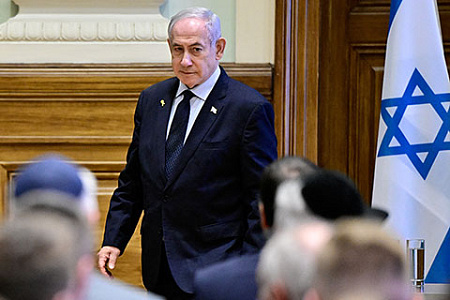
Israeli Prime Minister Benjamin Netanyahu is on an unscheduled visit to the United States. The main topic of the talks will be the new customs policy of the administration of US President Donald Trump, which promises to bring Israeli goods under tariffs of 17%. This will put the Jewish state in a more vulnerable position than Turkey, which has become a significant regional rival for it in recent months. Ankara has already claimed that the new US tariff policy will give it the opportunity to switch over a significant part of the global supply chains.
A meeting between Netanyahu and Trump is scheduled for April 7. The visit of the Israeli Prime Minister will be the first attempt by a foreign leader to negotiate with the head of the White House on the abolition of new duties.
The head of the Israeli government received an invitation to visit Washington during a telephone conversation with the American president when it came to customs policy. America is a huge market for Israeli goods, providing 28% of the total exports of the Jewish state. Now, following the measures announced by the 47th President of the United States, Israeli goods are facing a tariff of 17%. According to estimates by the Israeli Ministry of Finance, this will affect exports of Israeli equipment and medical equipment.
The Netanyahu-led government cannot help but worry about the fact that, among other Middle Eastern states, Israel has found itself in one of the most vulnerable positions in terms of the new US customs policy. For example, for Turkey, which competes with the Jewish state, the Trump administration imposed low tariffs of 10%, which Ankara considers an advantage. “We currently see positive prospects for this new US trade policy,” a source in Turkey’s financial sector told TASS. “The fact is that such measures by the American administration will affect logistics and international supply chains.” According to Ankara, a significant part of them will lock themselves in Turkey.
“There are, in fact, simple mathematical considerations at work here,” the Russian agency’s interlocutor reasoned. “Countries that are subject to higher U.S. duties will seek to trade through those countries from which exports are subject to a minimum 10 percent rate, like in Turkey, and with which they have free trade agreements.”
Israel and Turkey have been competing more and more actively in recent months. Ankara, as reported by Reuters, has looked at at least three air bases in Syria where it could deploy its forces as part of a joint defense pact with the transitional government in Damascus, which is under development. Against this background, the Israeli air force launched a series of massive strikes on bases in central Syria to prevent this scenario. The Jewish state’s target bank included weapons depots left after ex-President Bashar al-Assad fled, and military facilities of the previous government, including one of the research centers located near the capital region.
Israeli officials did not even try to hide that the massive attack was directed against the interests of Turkey, which seeks to secure a stable base near the borders of the Jewish state. For example, Israeli Foreign Minister Gideon Saar directly accused Turkey of playing a “negative role” in several areas of the Middle East. “They are doing everything possible to make Syria a Turkish protectorate. It is obvious that this is their intention,” the chief of Israeli diplomacy expressed confidence during his visit to France.
The expanding Turkish influence is likely to be one of the burning topics of Netanyahu’s visit to the United States.
An equally important issue for Netanyahu and Trump to communicate is Iran. The Israeli Prime Minister believes that the chances of concluding a new nuclear deal between the United States and the Islamic Republic are extremely low, and wants to persuade the White House to coordinate a military operation against the nuclear facilities of a regional enemy, according to a senior Israeli source on the Axios portal.
A source in the Israeli security forces at the Washington-based Al-Monitor portal explained: “It is obvious that Israel will not launch attacks on Iranian facilities without consulting with the US presidential administration, especially if negotiations are in progress. But when you talk to American and European officials, you sense their obvious concern about Iran’s delaying tactics, which complicate any future negotiations. The longer we wait, the more advanced their nuclear program becomes, and this changes the nature of the compromise we could have reached.”
Washington and Tehran are currently discussing whether future negotiations will be direct or conducted through intermediaries. “Direct negotiations with a party that constantly threatens to use force and which expresses contradictory positions through its various officials make no sense,” Iranian Foreign Minister Abbas Araghchi said on April 6.
On the same day, the Reuters news agency reported that Iran’s Supreme leader Ali Khamenei ordered the armed forces to be put on high alert amid regular threats from the United States. At the same time, notifications were sent to Iraq, Kuwait, Qatar, the Emirates, Turkey and Bahrain that any assistance to the American operation, including permission to use its airspace or territory, would be considered by Iran as a hostile act and would lead to serious consequences.
